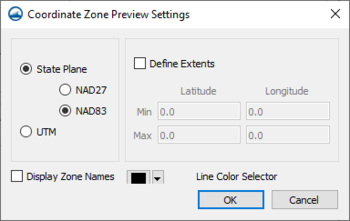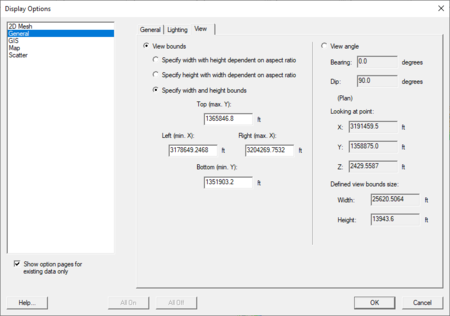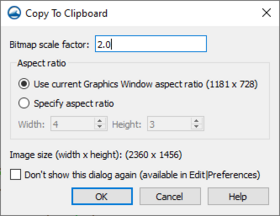SMS:General Display Options: Difference between revisions
| (38 intermediate revisions by the same user not shown) | |||
| Line 1: | Line 1: | ||
The ''General Display'' options control display of general graphical control. It includes three tabs including: | The ''General Display'' options control display of general graphical control. It includes three tabs including: | ||
[[ | ==General Tab== | ||
[[File:SMS Display Opts General 13.2.png|thumb|450 px|''Display Options'' dialog showing the ''General'' tab]] | |||
===Lighting Tab | *''Drawing Options'' – | ||
**[[SMS:Z Magnification|''Z magnification'']] – Exaggerates the z scale so that the variation in the z value is more apparent. | |||
**''Background color'' – Set the background color of the Graphics Window. | |||
** ''Erase behind labels'' – Causes SMS to fill the region behind labels such as the contour legend or annotation text with a background colored rectangle. This can prevent the label from being hidden in the rest of the image on the Graphics Window. | |||
*''Triad'' – SMS can display a coordinate triad at the lower left of the screen to display the orientation of the data in the display window. The size and color of this triad can be specified. | |||
*''Texture mapping'' – Currently SMS supports images displayed in the background and texture maps draped over TINS, grids, and meshes. | |||
*''Drawing Grid'' – SMS can display a grid (in plan view) behind all data on the graphics window. | |||
**''Grid Spacing'' – Specifies the increment between grid points. Remember that the grid can be used for both snapping and display, and not all grid lines need to be displayed. | |||
**''Snap to Grid'' – If this option is on, newly created points, nodes and vertices are moved to the nearest point on the grid. | |||
**''Display grid lines every ''n'' spaces'' – Enables the display of a line at the select interval. The line style is also selected. | |||
**''Display grid points every ''m'' spaces'' – Enables the display of a point at selected intervals along with the symbol attributes for the points. | |||
*''Projection Overlay'' – Controls the display of coordinate system zones in the Graphics Window in the background of the display. | |||
** ''Enable''– Turns on the coordinate system preview option. If the option is enabled, SMS will display the coordinate system zones from the selected group of zones in the background of the Graphics Window. If the [[Projections#Display_Projection|display projection]] is set to ''Local'', this feature can not be enabled. The zones that overlap the current range of the display will be visible. | |||
** '''Configure''' – Brings up the ''Coordinate Zone Preview Settings'' dialog where the display options for the coordinate system preview is set. | |||
*''Screen capture'' – This section contains options for taking a screen shot of the Graphics Window display. | |||
**''Show screen capture box'' – When turned on, the Graphics Window will display a box that indicates the area of the screen capture. The color picker next to this option can be used to select the color of this box. | |||
***'''Screen Capture Box Size''' – Opens the ''Copy to Clipboard'' dialog which allows adjusting the size of the screen capture box. | |||
==Coordinate Zone Preview Settings== | |||
[[File:Coordinate Zone Preview Settings.png|thumb|350 px|The ''Coordinate Zone Preview Settings'' dialog]] | |||
The ''Coordinate Zone Preview Settings'' dialog has the following options: | |||
* Coordinate system to preview – Choose one of the following: | |||
**''State Plane'' – The U.S. State Plane system using one of the following geodetic datum: | |||
*** ''NAD27'' | |||
*** ''NAD83'' | |||
** ''UTM'' – The Universal Transverse Mercator coordinate system. | |||
* ''Define Extents'' – By default SMS will display any coordinate zone from the selected system that overlaps the Graphics Window view. If the ''Define Extents'' option is on, specify a range of latitude and longitudes coordinates in the table below. Only coordinate zones that lie in that subrange will be displayed. | |||
* ''Display Zone Name'' – Gives the option to display the zone label name along with the coordinate system boundary. | |||
* ''Line Color Selector'' – Chooses the color to display the boundaries of the visible coordinate zones using the color picker or clicking on the box to being up the [[SMS:Display_Options#Color|''Select Color'']] dialog. | |||
==Lighting Tab== | |||
The ''Lighting'' tab accesses the [[Lighting Options|Lighting Options]] in SMS. | The ''Lighting'' tab accesses the [[Lighting Options|Lighting Options]] in SMS. | ||
==View Tab== | |||
[[Image:SMS Displaying Opts View.png|thumb|450 px|''Display Options'' dialog showing the ''View'' tab]] | |||
The ''View'' tab in the general display options allows editing the current view parameters. This includes the specification of the type of view (plan or 3D) and the range of the data that is displayed on the screen. | The ''View'' tab in the general display options allows editing the current view parameters. This includes the specification of the type of view (plan or 3D) and the range of the data that is displayed on the screen. | ||
[[ | |||
The view parameters can be set in two ways: ''View bounds'' or ''View angle''. | |||
''View bounds'' is used for 2D viewing. The minimum and maximum X (left/right) and Y (top/bottom) dimensions for the display in the graphics window can be set. The dimension that can be set depends on which of the following options are set: | |||
* ''Specify width with height dependent on aspect ratio'' | |||
* ''Specify height with width dependent on aspect ratio'' | |||
* ''Specify width and height bounds'' | |||
''View angle'' is used for 3D viewing. It allows setting the following options: | |||
*''Bearing'' | |||
*''Dip'' | |||
*''Looking at point'' – This section allows defining a point for the center of the display. Set the ''X'', ''Y'', and ''Z'' values for this point. | |||
*''Define view bounds size'' – This section allows defining the viewing bounds of the display. Set the ''Width'' and ''Height'' of the boundary area. | |||
==Copy To Clipboard== | |||
[[File:CopyToClipboard.png|thumb|280 px|The ''Copy To Clipboard'' dialog]] | |||
The ''Copy To Clipboard'' dialog contains options for how the '''Copy to Clipboard''' command works. It can be accessed through the ''Edit'' | '''Copy to Clipboard''' command or through the ''Display Options'' dialog. The dialog has the following options: | |||
*''Bitmap scale factor'' – Set the scaling factor (resolution) for the copied bit map image. | |||
*''Aspect ratio'' – This sections has options for defining the aspect ratio of the screen capture box. | |||
**''Use current Graphics Window aspect ration'' – The default option. This will use the aspect ratio of the Graphics Window for the screen capture box. | |||
**''Specify aspect ratio'' – This option allows setting a user-define aspect ratio for the screen capture box. | |||
***''Width'' – Defines the horizontal ratio for the screen capture box. | |||
***''Height'' – Defines the vertical ratio for the screen capture box. | |||
*''Image size'' – This will show the current image size for the copied image. | |||
**''Don't show this dialog again'' – This option will cause the ''Copy to Clipboard'' dialog to not appear when the '''Copy to Clipboard''' command is used. | |||
==Related Topics== | ==Related Topics== | ||
| Line 35: | Line 73: | ||
[[Category:SMS Display Options|G]] | [[Category:SMS Display Options|G]] | ||
[[Category:SMS Display Dialogs]] | [[Category:SMS Display Dialogs]] | ||
Latest revision as of 15:09, 12 July 2024
The General Display options control display of general graphical control. It includes three tabs including:
General Tab
- Drawing Options –
- Z magnification – Exaggerates the z scale so that the variation in the z value is more apparent.
- Background color – Set the background color of the Graphics Window.
- Erase behind labels – Causes SMS to fill the region behind labels such as the contour legend or annotation text with a background colored rectangle. This can prevent the label from being hidden in the rest of the image on the Graphics Window.
- Triad – SMS can display a coordinate triad at the lower left of the screen to display the orientation of the data in the display window. The size and color of this triad can be specified.
- Texture mapping – Currently SMS supports images displayed in the background and texture maps draped over TINS, grids, and meshes.
- Drawing Grid – SMS can display a grid (in plan view) behind all data on the graphics window.
- Grid Spacing – Specifies the increment between grid points. Remember that the grid can be used for both snapping and display, and not all grid lines need to be displayed.
- Snap to Grid – If this option is on, newly created points, nodes and vertices are moved to the nearest point on the grid.
- Display grid lines every n spaces – Enables the display of a line at the select interval. The line style is also selected.
- Display grid points every m spaces – Enables the display of a point at selected intervals along with the symbol attributes for the points.
- Projection Overlay – Controls the display of coordinate system zones in the Graphics Window in the background of the display.
- Enable– Turns on the coordinate system preview option. If the option is enabled, SMS will display the coordinate system zones from the selected group of zones in the background of the Graphics Window. If the display projection is set to Local, this feature can not be enabled. The zones that overlap the current range of the display will be visible.
- Configure – Brings up the Coordinate Zone Preview Settings dialog where the display options for the coordinate system preview is set.
- Screen capture – This section contains options for taking a screen shot of the Graphics Window display.
- Show screen capture box – When turned on, the Graphics Window will display a box that indicates the area of the screen capture. The color picker next to this option can be used to select the color of this box.
- Screen Capture Box Size – Opens the Copy to Clipboard dialog which allows adjusting the size of the screen capture box.
- Show screen capture box – When turned on, the Graphics Window will display a box that indicates the area of the screen capture. The color picker next to this option can be used to select the color of this box.
Coordinate Zone Preview Settings
The Coordinate Zone Preview Settings dialog has the following options:
- Coordinate system to preview – Choose one of the following:
- State Plane – The U.S. State Plane system using one of the following geodetic datum:
- NAD27
- NAD83
- UTM – The Universal Transverse Mercator coordinate system.
- State Plane – The U.S. State Plane system using one of the following geodetic datum:
- Define Extents – By default SMS will display any coordinate zone from the selected system that overlaps the Graphics Window view. If the Define Extents option is on, specify a range of latitude and longitudes coordinates in the table below. Only coordinate zones that lie in that subrange will be displayed.
- Display Zone Name – Gives the option to display the zone label name along with the coordinate system boundary.
- Line Color Selector – Chooses the color to display the boundaries of the visible coordinate zones using the color picker or clicking on the box to being up the Select Color dialog.
Lighting Tab
The Lighting tab accesses the Lighting Options in SMS.
View Tab
The View tab in the general display options allows editing the current view parameters. This includes the specification of the type of view (plan or 3D) and the range of the data that is displayed on the screen.
The view parameters can be set in two ways: View bounds or View angle.
View bounds is used for 2D viewing. The minimum and maximum X (left/right) and Y (top/bottom) dimensions for the display in the graphics window can be set. The dimension that can be set depends on which of the following options are set:
- Specify width with height dependent on aspect ratio
- Specify height with width dependent on aspect ratio
- Specify width and height bounds
View angle is used for 3D viewing. It allows setting the following options:
- Bearing
- Dip
- Looking at point – This section allows defining a point for the center of the display. Set the X, Y, and Z values for this point.
- Define view bounds size – This section allows defining the viewing bounds of the display. Set the Width and Height of the boundary area.
Copy To Clipboard
The Copy To Clipboard dialog contains options for how the Copy to Clipboard command works. It can be accessed through the Edit | Copy to Clipboard command or through the Display Options dialog. The dialog has the following options:
- Bitmap scale factor – Set the scaling factor (resolution) for the copied bit map image.
- Aspect ratio – This sections has options for defining the aspect ratio of the screen capture box.
- Use current Graphics Window aspect ration – The default option. This will use the aspect ratio of the Graphics Window for the screen capture box.
- Specify aspect ratio – This option allows setting a user-define aspect ratio for the screen capture box.
- Width – Defines the horizontal ratio for the screen capture box.
- Height – Defines the vertical ratio for the screen capture box.
- Image size – This will show the current image size for the copied image.
- Don't show this dialog again – This option will cause the Copy to Clipboard dialog to not appear when the Copy to Clipboard command is used.
Related Topics
SMS – Surface-water Modeling System | ||
|---|---|---|
| Modules: | 1D Grid • Cartesian Grid • Curvilinear Grid • GIS • Map • Mesh • Particle • Quadtree • Raster • Scatter • UGrid |  |
| General Models: | 3D Structure • FVCOM • Generic • PTM | |
| Coastal Models: | ADCIRC • BOUSS-2D • CGWAVE • CMS-Flow • CMS-Wave • GenCade • STWAVE • WAM | |
| Riverine/Estuarine Models: | AdH • HEC-RAS • HYDRO AS-2D • RMA2 • RMA4 • SRH-2D • TUFLOW • TUFLOW FV | |
| Aquaveo • SMS Tutorials • SMS Workflows | ||



